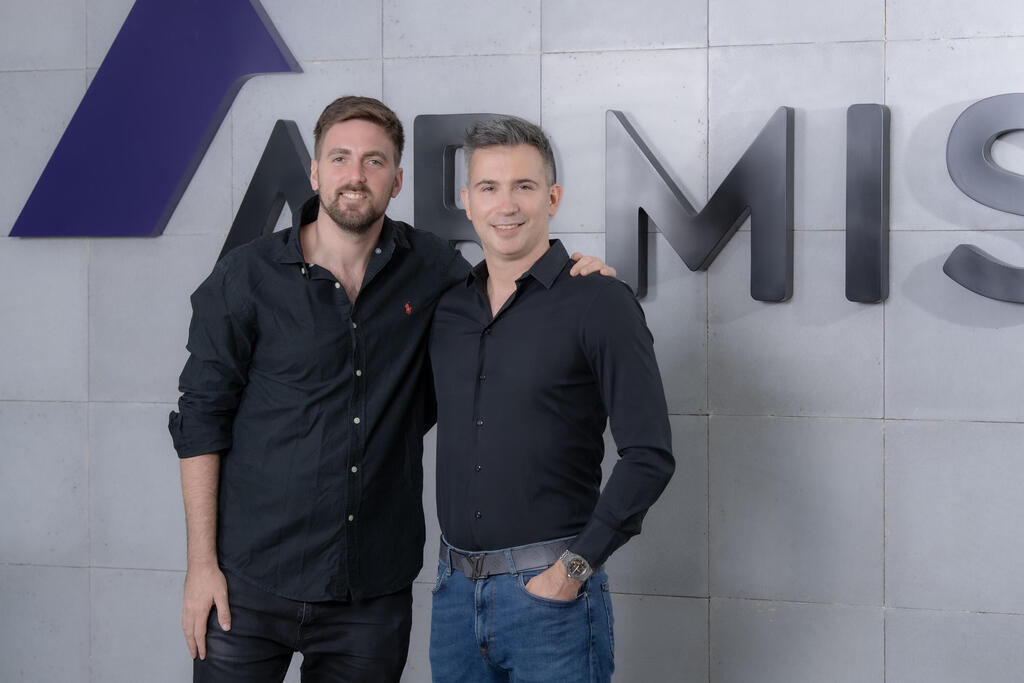
Armis president sets bold goal: $1B in sales in three years, IPO in two
Cybersecurity firm's president Alex Mosher says growing demand, AI-driven innovation, and a multi-product platform put it on track for massive growth.
The Wiz-Google deal has cast a strong spotlight on Israeli cyber, and one of the companies likely to benefit significantly from it is Armis Security. Founded by Yevgeny Dibrov and Nadir Izrael, Armis is considered a top candidate for a major IPO in the coming years.
In an interview with Calcalist, Alex Mosher, the company's new president, spoke about Armis's future, setting goals of reaching $1 billion in sales within three years and going public within two years at the latest, depending on market conditions.
Mosher argues that the proliferation of niche companies offering only a single feature is “bad for the industry.” He promises that Armis will continue its aggressive growth, acquire more companies, and expects the cyber market to enter a broad “arms race” following the Wiz acquisition — including in Israel.
Mosher was appointed president of Armis in February. Now in his mid-40s, he previously served as the company's Chief Revenue Officer (CRO). He joined in 2021, when Armis was generating less than $20 million in ARR (Annual Recurring Revenue). Four years later, the company now generates over $250 million in ARR and employs around 850 people globally. Its clients include more than 40 Fortune 100 companies, such as United Airlines, Colgate-Palmolive, and the USPS.
Armis has made three acquisitions in the past 12 months: CTCI for approximately $20 million, Silk Security for $150 million, and Otorio for around $120 million.
The company is at a pivotal stage in its development. It was acquired five years ago by Insight Partners for $1.1 billion. In 2020, not everyone believed in its long-term trajectory, but the company has continued to evolve. While it didn’t initially achieve explosive growth like Wiz, it never stagnated either.
What do you think of Armis’s path from its acquisition to today?
“I think we’re on an excellent growth path right now. I joined shortly after Insight’s investment in Armis — the organization was much smaller then. Last August, we announced that we had surpassed the $200 million mark in ARR after growing from $100 million to $200 million in just 18 months. (Today, Armis is already generating over $250 million — MO.) We’ve maintained that growth rate and built the organization to support it. We’ve made three acquisitions in the last 12 months, and just last month we acquired Otorio and sent a strong message to the market. I believe we’ve been leading this space aggressively in recent years, and we remain on track to reach over $1 billion in revenue.”
How long do you think it will take to hit $1 billion in revenue?
“At our current growth rate — although we know that growth can naturally taper over time — we are on track to surpass $1 billion in ARR within the next three fiscal years.”
And do you think the IPO will come before or after that? When will Armis be ready to go public?
“Yevgeny (Dibrov, CEO and co-founder of Armis – MO) has been very clear: Armis should become a public company. We are working hard to build the company accordingly, and we are committed to that path. But of course, everything depends on market conditions.”
Everyone says it depends on the market. But if the market is favorable, when do you think would be the right time?
“If the market is right, then the right time for Armis to go public could be within the next 12 to 24 months.”
We saw a major shake-up in the cyber industry with the acquisition of Wiz. What do you think about that deal?
“It’s a fantastic outcome for the employees and shareholders of Wiz — it’s a huge deal. It’s Google’s largest acquisition, by a wide margin, especially in cybersecurity. It shows Google’s intent to be the dominant player in cloud security, and that’s exciting. We think this will lead to more opportunities and further investment.”
But isn’t that also a threat? Google could compete with you too — it’s not only fuel for growth, but also competition.
“I don’t see it as a threat. Armis and Google have had a great partnership for years — including through CapitalG, which is one of our investors. We’ve also partnered closely on marketing and sales. If you look at the market, what customers want are comprehensive platforms — not just a single solution, but multiple integrated ones. Google, with Wiz, is offering a platform in cloud security. Armis, on the other hand, offers a robust platform in cyber exposure management (CEM).”
Are we about to see a wave of acquisitions and an arms race?
“Yes. We haven’t seen many major acquisitions in recent years, just a few smaller ones. But I believe many large, traditional tech players need to inject high growth into their portfolios. I spent a lot of time in M&A during my tenure at CA Technologies. We made acquisitions to drive growth, and it worked. The model proved successful — those acquisitions became core parts of the business, not only at CA but later at Broadcom as well. I think many others will adopt the same model.”
Will this also happen in Israel — the so-called ‘cyber nation’? Will we see a wave of Israeli cyber acquisitions following the Google deal?
“Absolutely. Israel has changed the narrative in this space by combining world-class talent with cutting-edge technology and bringing it to market. A few decades ago, if you wanted cyber, you had to build it here in the U.S. There just wasn’t enough talent. Today, U.S. companies have excellent partners in Israel, and American investors are actively investing there — with great success. We’ve seen amazing companies come out of Israel, and I believe we’ll continue to see more — leading to future acquisitions or IPOs from Israel.”
We’re seeing that the market is fragile. Donald Trump returned to the scene and many thought it would be a boon for the industry, but we’re not really seeing that—at least not in terms of a wave of IPOs. What happens if IPOs don’t come back? Will companies be able to survive, or will they just look to be acquired?
“No. The market demand for cybersecurity is still strong. We’re not seeing any slowdown at all, and we don’t expect one. At Armis, we continue to see tremendous growth opportunities—not just this year, but in the years ahead. We can continue to grow very aggressively in this market.”
Cybersecurity is a huge sector—it’s not new. But are there areas within cloud security, or cyber more broadly, where demand isn’t as high as you expected?
“I think one of the more interesting areas is GRC—Governance, Risk Management, and Compliance. It’s been around for many years but hasn’t grown as fast as other areas in cybersecurity. But anything related to cloud, and particularly Exposure Risk Profiling, is going to be hot in the coming years. Geopolitical developments are pushing organizations to reinvest in cybersecurity. When I talk to executives, they say: ‘I waited too long to invest in cybersecurity—now I have to catch up.’ They’re realizing they need to close the gap between the reality of being constantly attacked and the need to protect their organizations and assets.”
Everyone is talking about AI. Could AI really reshape the industry—even Armis? For example, could a ‘new Armis’ with a strong AI team emerge and take over the market? There are a lot of ‘killer’ companies. Could there be an ‘Armis killer’?
“There’s a big difference between hype and reality. In the world of hype, anything is possible. But in reality, if you look at what Armis has built—there’s a huge amount of intellectual property embedded in our engine. Our Centrix platform powers everything we do. Today, we manage and secure over 5 billion devices globally. That’s unique to Armis—no one else comes close. No matter how advanced your AI is, it still takes time and money to understand and secure all those assets. And our platform itself is already an AI engine, built from all the knowledge and data we’ve collected from customers and environments around the world.”
Do you think AI, with the right people and technology, can truly transform the cybersecurity industry?
“Yes, absolutely—and it's already happening on two fronts. On the attacker side, cybercriminals are using AI to infiltrate organizations. Their phishing emails are cleaner, more convincing. They’re also using AI to target specific individuals within companies, making attacks more sophisticated. So on the defense side, organizations must also adopt AI to keep up. It’s no longer optional.”
Will Armis need to develop or acquire more AI capabilities to stay relevant?
“Yes, without a doubt. Our founders—Yevgeny Dibrov and Nadir Izrael—talk a lot about Armis becoming a higher-level security and predictive tool. A big part of that vision involves AI, both in terms of integrating it and building our own internal capabilities. The goal is to help customers think proactively—where to invest, how to identify threats before they happen. Even now, with acquisitions like CTCI, we have early warning systems that alert customers to threats in real time, often before CISA (the U.S. Cybersecurity and Infrastructure Security Agency) publishes anything.”
A few years ago, hardly anyone knew what a Chief Information Security Officer (CISO) was. Now it’s a respected and coveted role. What do you make of that transformation?
“Today, everyone understands that cybersecurity is central to running a business. It can even be a competitive advantage. Companies that invest in strong CISOs and cybersecurity are more trustworthy—to customers and partners alike. I think it’s great that the industry has evolved in this way. Last week, I was in New York with our client advisory board, and we talked about how people ended up in cybersecurity and CISO roles. What stood out is that, for many—especially people with gray hair like me—it wasn’t planned. But today’s generation of CISOs is different. They’re choosing this path. Their careers are developing around it. I believe that every organization, regardless of size, needs to think about its cybersecurity strategy and how to protect itself.”
Are organizations spending more on cybersecurity than before? What’s your outlook for 2025 and 2026?
“If you go back to 2020, there was a surge in cybersecurity spending due to the shift to remote work during the pandemic. Organizations had to rethink how to protect remote employees. But once that challenge was solved, investment in those specific technologies slowed down. Since the second half of 2024, though—and definitely into 2025 and beyond—we’re seeing a renewed urgency. That’s one of the reasons behind the acquisition of companies like Wiz and others: there’s a realization that we underinvested in cybersecurity for too long. Now, the industry is reinvesting aggressively. Threat actors are becoming more sophisticated, using AI and other tools to attack organizations, governments, and everything in between. The threat landscape is evolving fast.”
Who are your direct competitors? Is Claroty one of them?
“People often mention Claroty or Axonius, but they’re not really direct competitors. Each of them offers a single product that competes with just one part of what we offer. Armis, on the other hand, has five products—and more than half of our customers use two or more of them. When we talk about real competition, we’re comparing portfolio to portfolio—with companies like Palo Alto Networks, Tenable, or even Microsoft. We do encounter niche players, but usually only when a customer is looking for a very specific feature. Once we have a chance to tell our full story, no one can match what we offer.”
How do you deal with the proliferation of niche cybersecurity companies? Are customers leaning more toward platforms?
“The abundance of niche companies is actually bad for the industry. Too many companies are built around a single feature, without a vision of how to grow into a platform. But the market has shifted. Senior decision-makers are looking for comprehensive platforms, not isolated features. The problem with buying too many feature-based tools is that someone then has to integrate them—and that takes time, effort, and often delivers little value.”
















